- Home
- Peter S. Beagle
The Last Unicorn
The Last Unicorn Read online
The Last Unicorn
Deluxe Edition
by Peter S. Beagle
The Last Unicorn © 1968 Peter S. Beagle. First published in the United States of America by Viking Press, an imprint of Penguin Group (USA) Inc., 375 Hudson Street, New York, NY 10014. Reprinted by permission of Avicenna Development Corporation.
“Two Hearts” © 2005 Peter S. Beagle. First published in the United States of America in the October/November 2005 issue of The Magazine of Fantasy and Science Fiction, a publication of Spilogale, Inc., PO Box 3447, Hoboken, NJ 07030. Reprinted by permission of Avicenna Development Corporation.
Introduction for The Last Unicorn © 2007 Peter S. Beagle. Introduction for “Two Hearts” © 2007 Connor Cochran. “A Conversation with Peter S. Beagle” © 2007 Connor Cochran. All reprinted by permission of Avicenna Development Corporation.
Cover art by Rebekah Naomi Cox.
Cover design by Yuan Fung.
Deluxe compilation edition © 2007 Peter S. Beagle. First published in this form by Barnes & Noble, Inc. for Roc, an imprint of New American Library, a division of Penguin Group (USA) Inc. Reprinted with permission of Avicenna Development Corporation.
ISBNs:
978-0-970-68015-0 (.mobi)
978-0-970-68016-7 (.epub)
978-0-970-68017-4 (.pdf)
Without limiting any rights under the copyrights noted above, no part of this edition may be scanned, stored, reproduced, distributed, or republished in any form or by any means without prior written authorization from the copyright holder.
This edition presents the definitive texts of The Last Unicorn and “Two Hearts,” as revised and corrected in 2007 by Peter S. Beagle and Connor Cochran.
Conlan Press offers printed books, audiobooks, graphic novels, and related merchandise from Peter S. Beagle and other writers through our webstore at http://www.conlanpress.com.
Contents
The Last Unicorn
Author’s Introduction
Chapter 1
Chapter 2
Chapter 3
Chapter 4
Chapter 5
Chapter 6
Chapter 7
Chapter 8
Chapter 9
Chapter 10
Chapter 11
Chapter 12
Chapter 13
Chapter 14
Two Hearts
Introduction
Two Hearts
A Conversation With Peter S. Beagle
Works by Peter S. Beagle
Afterword
About the Author
The Last Unicorn
Author’s Introduction
In April of 1968 I wrote an essay for the San Francisco Chronicle, on the eve of the publication of The Last Unicorn. I was living in a rickety, unheated shack on a redwood hillside, just a few miles out of Santa Cruz, with my young family, one dog, one pigeon (the dog’s faithful lifelong buddy) and a cat population that could best be described as in perpetual flux. I wrote The Last Unicorn there, and hated the book when I was done—saw it as a complete failure, an embarrassment. I hated it for at least a year. Then, as I tried to describe in that essay, reprinted here for the first time, a thing happened….
A few nights ago I read from The Last Unicorn in a Santa Cruz coffeehouse, and discovered that I like the book. It was the greenwood chapter: the scene introducing the outlaw Captain Cully and his miserable men. People laughed, and that was pleasing enough (my idea of hell for a writer would feature the eternal writing and revising of something that’s supposed to be funny). But that wasn’t it. Somewhere, literally between one sentence and another, I realized that I’d written a good book. I’ve been a little dizzy since, and I still am.
It’s very strange, living with a book—not only during the writing but long after, when you begin to find out what you wrote, and have to come to terms with it. I began writing The Last Unicorn in the summer of 1962, gave it up at about 85 pages, bored and uninventive; made the journey that became I See By My Outfit; and finally got back to work on that unicorn story. One chapter was salvaged from that bad start, and one song.
I made it up as I went along, trying—as much as I ever told myself what I was doing—to keep my options open as long as possible; deliberately painting myself into corners, laying groundwork for developments that might or might not develop, as the story and its people felt like it. When I felt like writing a little song, or just rhyming something—and those songs are the little love affairs for me, the raisins in the cookie—I wrote a song; and when I knew that it was time for someone to join the story, that it couldn’t go any further until a new character came on the scene, I waited, gambling that it would be the right somebody who showed. Schmendrick the Magician wandered into the tale out of bedtime stories I used to tell my eldest daughter; and I’ve had a favorite painting of unicorns and bulls since I was 15. The cat is one of ours. I’m not sure where the other people and beings in the tale came from, though I make my guesses. I had to wait a long time for King Haggard.
For all that spontaneity, the truth is that The Last Unicorn was a grubby, sweaty, joyless job of work, except now and then. It was squeezed and twisted out of an imagination that never felt as though it had very much to give. I went through black cycles of depression and self-disgust, lightened by occasional periods when I felt that the book had been a bad idea in the first place, and at least it wasn’t as though I was messing up something pretty. But most of the time I knew that the unicorn, Schmendrick, Lír, Molly Grue, and all the rest were alive, and that I was failing them. I don’t know for sure that that’s the worst feeling an author can have, being still new to the trade. But it’s the worst one I know so far.
The writing of fantasy is best left to those who have nothing better to do, as is indicated by the fairy tales of otherwise gifted writers like Robert Graves and John Ciardi. It isn’t so much the difficulty of doing it right, without falling off the tightrope into the cold pits of allegory or mindless whimsy—the weary thing is that even if you bring it off, all you’ve done is write a fantasy, and so what? Life is dangerous, and escapism has become a dirty word. I feel the same way, being a child of my own critical times. I’d write the other stuff, the real books, if I could. Plenty nitty-gritty. If I could.
But I’m with Disraeli when he says “Madam, when I want to read a good book, I write one.” I wrote The Last Unicorn for me to read, and for no other reason that I understand just yet; and when I was through with it at last, and off the tightrope, I couldn’t bear to look at the thing. People whose opinions meant a good deal to me liked it, and I was glad, but it didn’t make any difference. I couldn’t see anything but me hacking away on the text—without grace, without love, without pleasure. Hell of a way to treat a unicorn.
But it’s all right; it’s all right; it’s a good book! I know that so securely now that nothing else matters, even if The Last Unicorn is on the 77-cent tables before school is out. The damn book is full of happiness, and I don’t know where it came from. I swear I don’t remember putting it in.
I have been recounting that story about the story to readers and live audiences for the last forty years. I’ve never said it better—or even as well—as I did then, and I’m not going to try to improve on it now. It touches me deeply, in ways I don’t usually talk about, and which I mostly forgot until I re-read the piece when preparing this new edition. I was twenty-nine years old when I wrote that essay, trying to learn how to take care of a wife and three small children—and all those cats—on a freelancer’s income. Money went a good deal further then, and a book advance would carry you for awhile; but even so, there were many months when I couldn’t come up with even a hundred dollars
for the rent. And the electricity would go out for weeks during the rainy season, and we’d have to take refuge with my sister-in-law in town—if the car would start, and if we could get down the washed-out, boulder-strewn mountain road. That was the world in which The Last Unicorn was written.
And yet, a year or so after the Chronicle essay was published, when we had moved to a larger house in the Watsonville area—a mansion by comparison with the red shack—I was the only one at all wistful about leaving. It took several trips back to load all the animals into the car, and each time I’d walk the empty house and the wild land around it (all paved and gentrified today), lingering in the half-ruined stable in the woods where I slogged away for so long at that damn book…in the back bedroom where I worked at night, or in bad weather…in the kitchen, where I scared the hell out of myself one afternoon, creating the harpy…in my oldest daughter’s bedroom, where I used to tell her the adventures of the world’s worst magician every night….
I was happy there. Frightened—God, yes!—but happy. I hadn’t known until that night in the coffeehouse, when I could finally read my own book and see it for what it was.
—Peter S. Beagle
Oakland, California
April 2007
To the memory of Dr. Olfert Dapper, who saw a
wild unicorn in the Maine woods in 1673,
and for Robert Nathan, who has seen
one or two in Los Angeles.
Chapter 1
The unicorn lived in a lilac wood, and she lived all alone. She was very old, though she did not know it, and she was no longer the careless color of sea foam, but rather the color of snow falling on a moonlit night. But her eyes were still clear and unwearied, and she still moved like a shadow on the sea.
She did not look anything like a horned horse, as unicorns are often pictured, being smaller and cloven-hoofed, and possessing that oldest, wildest grace that horses have never had, that deer have only in a shy, thin imitation and goats in dancing mockery. Her neck was long and slender, making her head seem smaller than it was, and the mane that fell almost to the middle of her back was as soft as dandelion fluff and as fine as cirrus. She had pointed ears and thin legs, with feathers of white hair at the ankles; and the long horn above her eyes shone and shivered with its own seashell light even in the deepest midnight. She had killed dragons with it, and healed a king whose poisoned wound would not close, and knocked down ripe chestnuts for bear cubs.
Unicorns are immortal. It is their nature to live alone in one place: usually a forest where there is a pool clear enough for them to see themselves—for they are a little vain, knowing themselves to be the most beautiful creatures in all the world, and magic besides. They mate very rarely, and no place is more enchanted than one where a unicorn has been born. The last time she had seen another unicorn the young virgins who still came seeking her now and then had called to her in a different tongue; but then, she had no idea of months and years and centuries, or even of seasons. It was always spring in her forest, because she lived there, and she wandered all day among the great beech trees, keeping watch over the animals that lived in the ground and under bushes, in nests and caves, earths and treetops. Generation after generation, wolves and rabbits alike, they hunted and loved and had children and died, and as the unicorn did none of these things, she never grew tired of watching them.
One day it happened that two men with long bows rode through her forest, hunting for deer. The unicorn followed them, moving so warily that not even the horses knew she was near. The sight of men filled her with an old, slow, strange mixture of tenderness and terror. She never let one see her if she could help it, but she liked to watch them ride by and hear them talking.
“I mislike the feel of this forest,” the elder of the two hunters grumbled. “Creatures that live in a unicorn’s wood learn a little magic of their own in time, mainly concerned with disappearing. We’ll find no game here.”
“Unicorns are long gone,” the second man said. “If, indeed, they ever were. This is a forest like any other.”
“Then why do the leaves never fall here, or the snow? I tell you, there is one unicorn left in the world—good luck to the lonely old thing, I say—and as long as it lives in this forest, there won’t be a hunter takes so much as a titmouse home at his saddle. Ride on, ride on, you’ll see. I know their ways, unicorns.”
“From books,” answered the other. “Only from books and tales and songs. Not in the reign of three kings has there been even a whisper of a unicorn seen in this country or any other. You know no more about unicorns than I do, for I’ve read the same books and heard the same stories, and I’ve never seen one either.”
The first hunter was silent for a time, and the second whistled sourly to himself. Then the first said, “My great-grandmother saw a unicorn once. She used to tell me about it when I was little.”
“Oh, indeed? And did she capture it with a golden bridle?”
“No. She didn’t have one. You don’t have to have a golden bridle to catch a unicorn; that part’s the fairy tale. You need only to be pure of heart.”
“Yes, yes.” The younger man chuckled. “Did she ride her unicorn, then? Bareback, under the trees, like a nymph in the early days of the world?”
“My great-grandmother was afraid of large animals,” said the first hunter. “She didn’t ride it, but she sat very still, and the unicorn put its head in her lap and fell asleep. My great-grandmother never moved till it woke.”
“What did it look like? Pliny describes the unicorn as being very ferocious, similar in the rest of its body to a horse, with the head of a deer, the feet of an elephant, the tail of a bear; a deep, bellowing voice, and a single black horn, two cubits in length. And the Chinese—”
“My great-grandmother said only that the unicorn had a good smell. She never could abide the smell of any beast, even a cat or a cow, let alone a wild thing. But she loved the smell of the unicorn. She began to cry once, telling me about it. Of course, she was a very old woman then, and cried at anything that reminded her of her youth.”
“Let’s turn around and hunt somewhere else,” the second hunter said abruptly. The unicorn stepped softly into a thicket as they turned their horses, and took up the trail only when they were well ahead of her once more. The men rode in silence until they were nearing the edge of the forest, when the second hunter asked quietly, “Why did they go away, do you think? If there ever were such things.”
“Who knows? Times change. Would you call this age a good one for unicorns?”
“No, but I wonder if any man before us ever thought his time a good time for unicorns. And it seems to me now that I have heard stories—but I was sleepy with wine, or I was thinking of something else. Well, no matter. There’s light enough yet to hunt, if we hurry. Come!”
They broke out of the woods, kicked their horses to a gallop, and dashed away. But before they were out of sight, the first hunter looked back over his shoulder and called, just as though he could see the unicorn standing in shadow, “Stay where you are, poor beast. This is no world for you. Stay in your forest, and keep your trees green and your friends long-lived. Pay no mind to young girls, for they never become anything more than silly old women. And good luck to you.”
The unicorn stood still at the edge of the forest and said aloud, “I am the only unicorn there is.” They were the first words she had spoken, even to herself, in more than a hundred years.
That can’t be, she thought. She had never minded being alone, never seeing another unicorn, because she had always known that there were others like her in the world, and a unicorn needs no more than that for company. “But I would know if all the others were gone. I’d be gone too. Nothing can happen to them that does not happen to me.”
Her own voice frightened her and made her want to be running. She moved along the dark paths of her forest, swift and shining, passing through sudden clearings unbearably brilliant with grass or soft
with shadow, aware of everything around her, from the weeds that brushed her ankles to insect-quick flickers of blue and silver as the wind lifted the leaves. “Oh, I could never leave this, I never could, not if I really were the only unicorn in the world. I know how to live here, I know how everything smells, and tastes, and is. What could I ever search for in the world, except this again?”
But when she stopped running at last and stood still, listening to crows and a quarrel of squirrels over her head, she wondered, But suppose they are hiding together, somewhere far away? What if they are hiding and waiting for me?
From that first moment of doubt, there was no peace for her; from the time she first imagined leaving her forest, she could not stand in one place without wanting to be somewhere else. She trotted up and down beside her pool, restless and unhappy. Unicorns are not meant to make choices. She said no, and yes, and no again, day and night, and for the first time she began to feel the minutes crawling over her like worms. “I will not go. Because men have seen no unicorns for a while does not mean they have all vanished. Even if it were true, I would not go. I live here.”
But at last she woke up in the middle of one warm night and said, “Yes, but now.” She hurried through her forest, trying to look at nothing and smell nothing, trying not to feel her earth under her cloven hooves. The animals who move in the dark, the owls and the foxes and the deer, raised their heads as she passed by, but she would not look at them. I must go quickly, she thought, and come back as soon as I can. Maybe I won’t have to go very far. But whether I find the others or not, I will come back very soon, as soon as I can.
Under the moon, the road that ran from the edge of her forest gleamed like water, but when she stepped out onto it, away from the trees, she felt how hard it was, and how long. She almost turned back then; but instead she took a deep breath of the woods air that still drifted to her, and held it in her mouth like a flower, as long as she could.

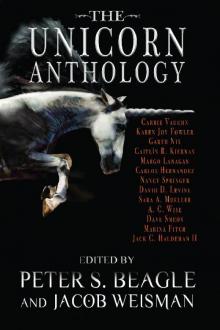 The Unicorn Anthology.indb
The Unicorn Anthology.indb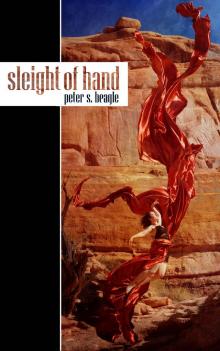 Sleight of Hand
Sleight of Hand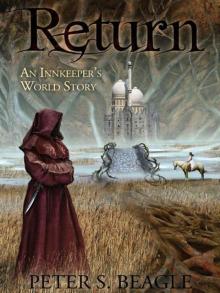 Return
Return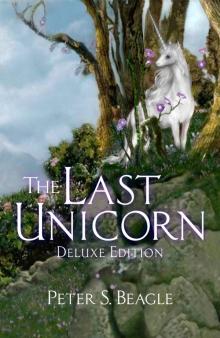 The Last Unicorn
The Last Unicorn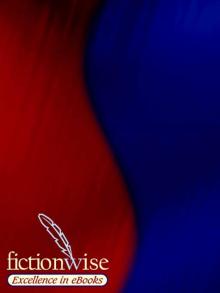 Two Hearts
Two Hearts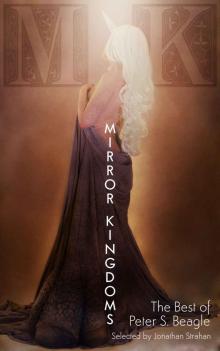 Mirror Kingdoms: The Best of Peter S. Beagle
Mirror Kingdoms: The Best of Peter S. Beagle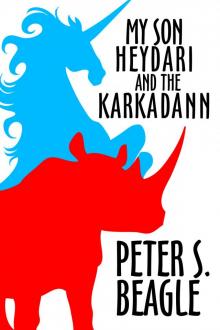 My Son Heydari and the Karkadann
My Son Heydari and the Karkadann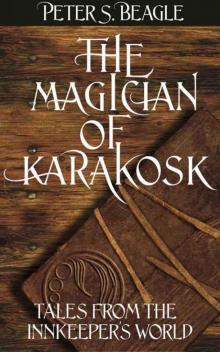 The Magician of Karakosk, and Other Stories
The Magician of Karakosk, and Other Stories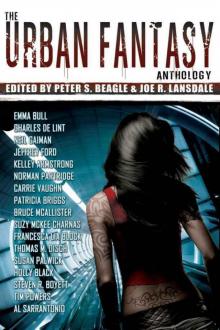 The Urban Fantasy Anthology
The Urban Fantasy Anthology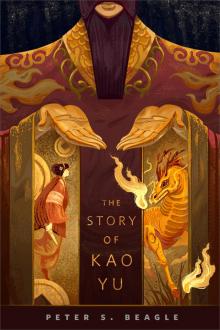 The Story of Kao Yu
The Story of Kao Yu The Karkadann Triangle
The Karkadann Triangle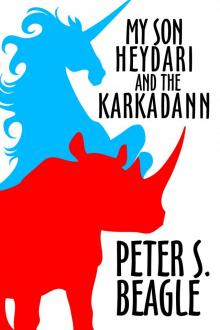 My Son and the Karkadann
My Son and the Karkadann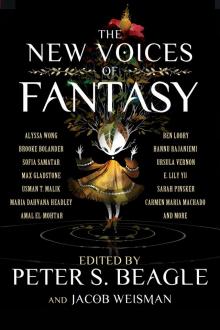 The New Voices of Fantasy
The New Voices of Fantasy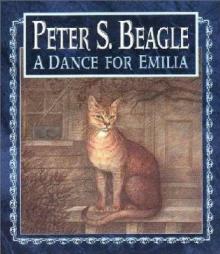 A Dance for Emilia
A Dance for Emilia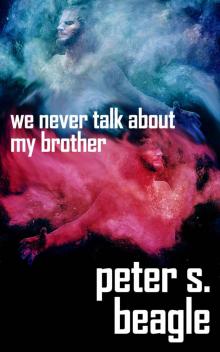 We Never Talk About My Brother
We Never Talk About My Brother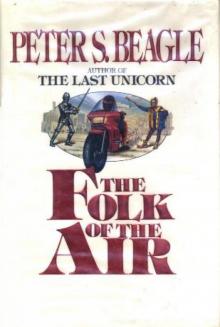 The Folk Of The Air
The Folk Of The Air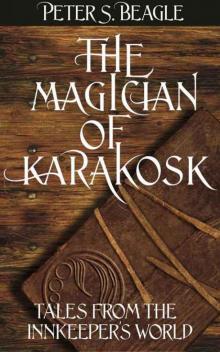 The Magician of Karakosk: Tales from the Innkeeper's World
The Magician of Karakosk: Tales from the Innkeeper's World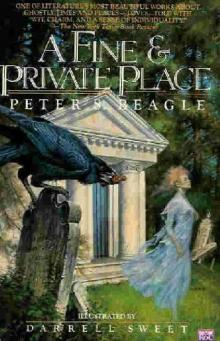 A Fine and Private Place
A Fine and Private Place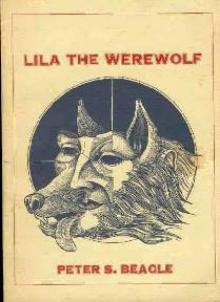 Lila The Werewolf
Lila The Werewolf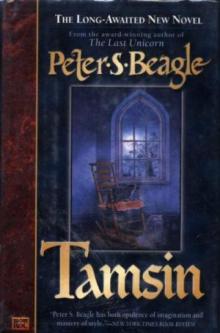 Tamsin
Tamsin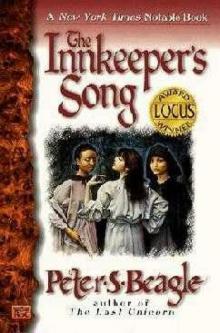 Innkeeper's Song
Innkeeper's Song